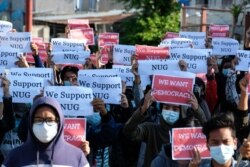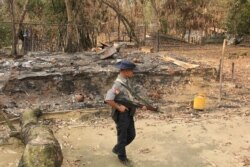U.S. Secretary of State Antony Blinken welcomed a pledge by a shadow government in Myanmar to address discrimination and human rights abuses against minority Rohingya Muslims.
Blinken said in a tweet Sunday that the pledge by the National Unity Government (NUG) is "an important signal to all those working for an inclusive, democratic future."
The NUG, set up by a group of ousted lawmakers in Myanmar, called last week for the Rohingya to help it overthrow the military government, promising the group citizenship in a future democratic state.
"We invite Rohingyas to join hands with us and with others to participate in this Spring Revolution against the military dictatorship," the group said in a statement.
Myanmar has been in turmoil since the military seized power in a February 1 coup, overthrowing a democratic government led by Aung San Suu Kyi.
A local monitoring group says security forces have killed at least 800 protesters and bystanders since the coup. Military leaders dispute the figures.
The military government has labeled members of the NUG shadow government as terrorists. The NUG is made up of ousted lawmakers, mostly from Suu Kyi's National League for Democracy.
The NUG has promised to repeal a 1982 law that denies citizenship to most Rohingya, and it said it was committed to repatriating more than 740,000 Rohingya who have fled to neighboring Bangladesh.
Muhammed Taher, a Rohingya teacher living in a Bangladesh refugee camp, told the VOA Rohingya Lifeline program that he welcomes the NUG's comments and that he is thankful the shadow government used the term "Rohingya" in its statement. Myanmar's government has generally avoided using the term, referring to the group as "Muslims living in Rakhine" state.
Taher, however, said that he has "no confidence" that the NUG would restore the citizenship rights of the Rohingya, and he noted that the shadow government has not included representatives from the group in its government.
Largely Buddhist, Myanmar has long faced criticism of its treatment of the Rohingya minority. The United Nations has accused the military of carrying out a campaign against the Rohingya with "genocidal intent."
Suu Kyi defended the military's conduct while she was still in power, coming under international criticism. She argued that Myanmar's security forces had carried out legitimate operations against Rohingya insurgents when the refugees went to Bangladesh.
Last month, junta leader Min Aung Hlaing cast doubt on the return of Rohingya Muslims from Bangladesh, according to Reuters news agency.
The Reuters news agency cited a transcript of an interview that Min Aung Hlaing gave to Chinese-language Phoenix Television, in which he was asked whether the Rohingya would be allowed back to Myanmar's Rakhine state.
"If it doesn't comply with Myanmar's laws, what else is there to consider? I don't believe there is any country in the world that would go beyond their own country's refugee laws to accept refugees," Min Aung Hlaing responded.
VOA's Bangla Service contributed to this report.







